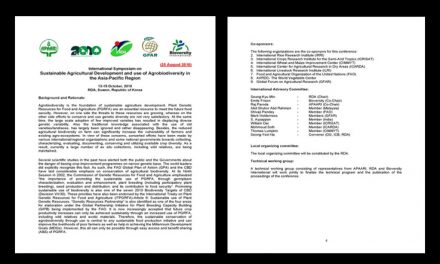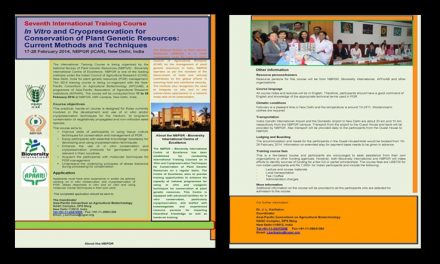Background and Rationale:
Pitaya or dragon fruit (Hylocereus spp. and Selenicereus spp.) is a climbing-vine cactus species native to the tropical forest regions of Mexico and Central and South America. In the past two decades, it has gained popularity among producers, exporters and consumers alike in Indonesia, Malaysia, Myanmar, the Philippines, Taiwan, Thailand, and Vietnam where agro-environmental conditions are conducive for growing this fruit plant. In Vietnam alone, its cultivation area is reaching near 30,000 hectares with 640,000 ton of fruit products in 2013. And several factors are accountable for the popularity of this crop: 1) high net returns; 2) functional properties because of its high level of antioxidants; and 3) emerging export potential to high-value markets in developed countries due to its uniqueness and health benefits. Pitaya also shows certain agronomic features that improve its potential as a replacement crop with high commercial value. These characteristics include: 1) the relative ease of propagation by cuttings; 2) its relatively low crop maintenance; 3) the short turnaround time between planting and harvesting compared to other tropical fruit trees; 4) its high yield rate; and 5) as a perennial crop, with proper care, it can provide a steady income.
However, on the negative side, many factors limit pitaya potential productivity and downgrade fruit quality. Among them, heavy rainfall events or poor crop management practices such as over-watering can cause flowers to drop, and fruit to split or rot. Apart from limiting the pitaya crop to reach its yield potential, prevailing poor production technologies also lead to serious occurrences of diseases and pests. Currently, anthracnose, stem canker, brown stem spots, and fruit rot are prevalent in major pitaya growing areas in the Asian-Pacific region. And the emerging infectious stem canker has recently caused collapses of many pitaya orchards in Southeast Asia. Protection measures to control these diseases with chemical pesticides are not only costly to small-scale farmers, they also can disrupt natural biological control, and are damaging to human health and the environment. On the other hand, to access higher-value markets of local, regional or international importance, pitaya fruit products need to be free from diseases, pests, blemishes and pesticide residues, along with desirable size, shape, color and taste. Addressing these issues, the implementation of integrated crop management systems including the use of healthy planting materials can improve yield and quality, forcing culture techniques extend the harvest season, and Good Agricultural Practices (GAP), which involve a systematic, stepwise on-farm operation, assure fruit product safety and quality that will benefit both farmers and consumers.
Therefore, the Food and Fertilizer Technology Center (FFTC) for the Asian and Pacific Region, Taiwan Agricultural Research Institute (TARI), and the Southern Horticultural Research Institute (SOFRI) in Vietnam join hands to organize the workshop to share the latest advances in understanding the constraints limiting pitaya production and marketing as well as newly-developed doable technologies such as optimal spacing, trellising, disease diagnosis, integrated pest management, pruning, phenology manipulation, and GAP that increase pitaya productivity, safety and marketability.
Workshop Objectives:
To contribute to the improvement in pitaya productivity, safety and marketability
To share the current state of pitaya research
To identify areas for collaboration in research and exchange of plant materials
Venue:
Fengshan Tropical Horticultural Experiment Branch of Taiwan Agricultural Research Institute, Kaohsiung, Taiwan
Workshop Activities:
The workshop will include theme papers, country reports, and field study tour.
September 6 (Sunday): Arrival of overseas participants
September 7 (Monday): Opening session, oral presentations
September 8 (Tuesday): Oral presentations, wrap-discussion, closing session
September 9 (Wednesday): Field study tour
September 10 (Thursday): Departure of overseas participants
Theme Papers:
Thirty one years of research and development on pitaya cultivation in Israel
Dr. Yosef Mizrahi, Emeritus Professor, Department of Life Sciences, Ben-Gurion University of the Negev, Israel
Pitaya breeding strategies for improving commercial potential in Taiwan
Dr. Chung-Ruey Yen, Vice President, National Pingtung University of Science and Technology, and Ms. Pi-Chuan Liu, Department of Tropical Fruit Trees, Fengshan Tropical Horticultural Experiment Branch, TARI, Taiwan
Fungal diseases of pitaya in Malaysia
Dr. Masratul Hawa Mohd, Senior Lecturer, Department of Plant Pathology, School of Biological Sciences, Universiti Sains Malaysia, Malaysia
Management strategies of major pitaya diseases in Vietnam
Dr. Nguyen Thanh Hieu, Researcher, Southern Horticultural Research Institute, Vietnam
Identification and management of pitaya stem canker and soft rot in Taiwan
Ms. Chu-Ping Lin, Assistant Researcher, Plant Pathology Division, Taiwan Agricultural Research Institute, Taiwan
Viral diseases of pitaya and other Cactaceae plants
Dr. Ya-Chun Chang, Professor and Head, Department of Plant Pathology and Microbiology, National Taiwan University, Taiwan
Control of pitaya insect pests in Vietnam for export markets
Dr. Le Quoc Dien, Researcher, Southern Horticultural Research Institute, Vietnam
Pitaya reproductive phenology in relation to production system
Dr. Wendy Wen-Ju Yang, Associate Professor, Department of Horticulture and Landscape Architecture, National Taiwan University, Taiwan
Innovative forcing culture techniques for off-season pitaya production
Dr. Yi-Lu Jiang, Assistant Professor, Department of Horticulture, National Chiayi University, Taiwan
Development and implementation of GAP on pitaya in Vietnam: Status and challenges
Dr. Nguyen Van Hoa, Director General, Southern Horticultural Research Institute, Vietnam
Value chain initiatives for pitaya market development
Dr. John Campbell, Consultant, “Development of Safe, Quality, Horticulture”, New Zealand
Registration:
Registration website: http://a.fftc.org.tw/survey/survey.php?sur_id=20150605144945
Further information or inquiries please contact with:
Carissa Huang, Workshop Secretary
Phone: (+886)-2-2362-6239 ext. 19
Fax: (+886)-2-2362-0478
E-mail: phhuang@fftc.org.tw
Registration Fee: Free
Abstract Contribution:
Abstract contributions are welcome on subjects within the scope of the workshop. Abstract should be submitted, by 10 August 2015, via e-mail to Ms. Carissa Huang. The one-page abstract should be typed single-spaced (12 pt Times New Roman font or equivalent, 2.5 cm margins, page size A4; size max 1024 kb) and should include the title, authors, their affiliations and addresses.
Hotel Accommodation:
Accommodation at the Garden Villa (http://www.gardenvilla.com.tw) can be arranged upon requested. The standard single-bed room is US$70/night
Local Transportation:
Pick-up service at Kaohsiung International Airport or Zuoying Station of Taiwan High Speed Rail, and shuttle service between the Garden Villa and the workshop venue will be provided. All other travel guidelines to or within Taiwan will be given later.




